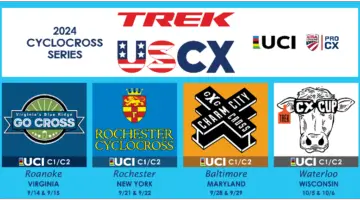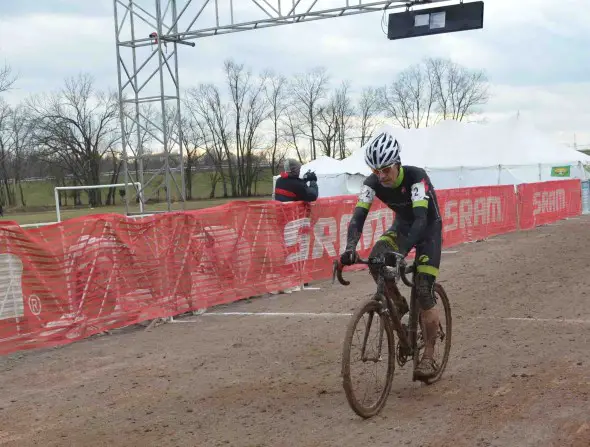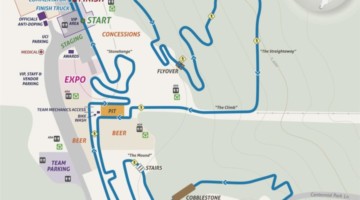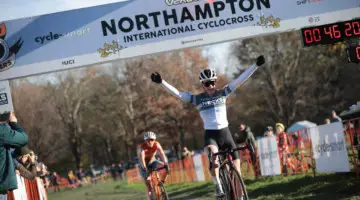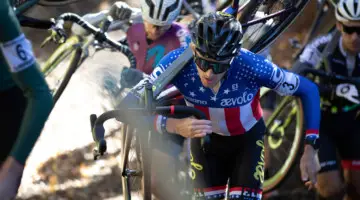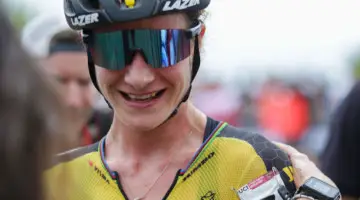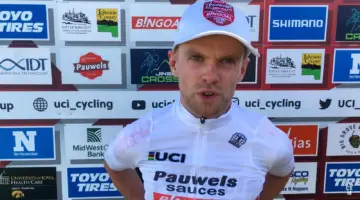by Sarah Kim Bonner
Recently, I chatted with Masters (60-64) World Cyclocross Champion Jim Laird to find out how he survived the mud, freezing temperatures and an all-American field to be the only Canadian to bring home the gold from Louisville.
Ten years ago Jim Laird hadn’t even heard of cyclocross. In fact, he had just started road racing when his teammate at the time, Jeff Bekal, suggested he try cyclocross to stay fit in the off-season. After one cyclocross event, Laird says, “It just went from there, I really liked it.” Fast forward to 2013 and Laird, who races for First Capital Cycling Kingston, ventured to Louisville, Kentucky to compete at World Cyclocross Championships. Through grueling weather conditions, even for cyclocross standards, Laird, now 60, finished five seconds ahead of the 60-64 Masters pack and was the only Canadian (and non-American) to return home with rainbow stripes.
Last Minute Challenges
In preparation for Worlds, 2012 was Laird’s biggest racing season to date with a total of 16 races from September to the beginning of December. Despite a rigorous race calendar, the Canadian winter kept him inside during the weeks leading up to Worlds and Laird admits he had doubts about his form.
“My last actual race was in early December. That’s a pretty big gap to try and cope with no racing over about 6 weeks. So there’s always a big question mark in the back of your mind, ‘how fit are you?’”
Racing fitness wasn’t the only thing Laird stumbled over in the run up to Louisville. Laird sent his bike in just before Christmas for a maintenance overhaul, only to learn his custom titanium frame was cracked.
“I panicked at that point. This was my race bike. It was a custom titanium build. Everything that I’d ever wanted in a bike was on that bike. So, now I had no bike because I can’t race a bike with a cracked tube.”
Since there was no time to fix the original frame, Laird enlisted the help of Canadian bicycle manufacturer Guru Bicycles.
“They agreed to build me a frame over the Christmas holidays. So that came in a week before I left for Louisville. I actually didn’t even get a chance to ride that bike before I left,” Laird says. “The first time I rode it was when I was ‘recon-ing’ the course on the Monday but, turns out, it’s an awesome bike.”
A Very Muddy Race Day
After qualifying for the final in second place, Laird, the only Canadian amid an all-American field, strategized to follow the race favorite and top qualifier, American National Masters Cyclocross Champion Charles Townsend. However, after a tornado warning the night before, the weather conditions on the day forced Laird to rethink his race strategy.
“The day of the race was very muddy and conditions had completely changed from the heats, from fast and dry to slow and muddy. While I was standing waiting for the start, I said ‘no, my previous strategy isn’t going to work.’ There was only one place to be and that was right at the front. To be the guy out front that everybody else is trying to catch. I got to that spot after the first turn in the course and, basically, I attempted to stay there for the rest of the race.”
The final consisted of three laps of a 2.6km course for a total of 7.8km. Although the course wasn’t overly technical, Laird said the mud was a race-defining issue.
“The last thing I did before the start of the race, I buckled my shoes down so tight my feet were numb because I thought the mud would suck the shoe right off,” Laird laughs. “The bikes were picking up a lot of mud so I literally pitted every half lap. [I had] two bike changes but…the top five guys in the race, we were all doing it,” Laird says.
“It was just like climbing Alpe d’Huez, you couldn’t ever stop putting pressure on the pedals. You couldn’t even really coast downhill. The mud was so thick that I barley remember touching my brakes, even on some of the downhill sections, it was just slow…You’re constantly striving to keep a complete power circle out of you pedal stroke because if you pushed hard your rear wheel would just spin.”
Despite the mud, the top five competitors remained close the entire race, but Laird managed to maintain his leading position.
“I didn’t ever feel comfortable [in the lead]. I think the most gap I ever had was about ten seconds but that didn’t seem like a lot to me considering the conditions because a fall, which I had, meant that I would lose five seconds per fall. I knew that, and I thought, when I was heading into the final series of downhills and uphill turns, that I had to be very, very conservative. I couldn’t take chances.”
Being conservative wouldn’t have meant anything if luck wasn’t on his side, Laird explains.
“The stars really have to line up for you in cyclocross. I think about that guy who had a flat tire heading into the last lap. Well he was just as strong as me and just as good a bike handler and really he could have won that race just as easily as I could have but, a flat tire. But that’s cyclocross: no such thing as a perfect race.”
Perfect race or not, Laird crossed the line solo with a gap of five seconds and a finishing time of 44:05. Laird admits it was the “hardest 45 minute race” he has ever done. “[Even] after so many seasons, my legs were so close to ceasing by the end of the race…it was a little bit scary.”
Laird also credits his win to his support team on the day that consisted of Alex Sanna, who was in the pit, and Andrew Croutch, who “logged epic miles running from point to point around that course,” Laird smiles. “Every turn I got to I heard his voice and he was telling me gaps and what the other guys were looking like, if they were starting to look a little tired. He was just a real cheering section.” He also notes Bob Woods, Bob Tysen, and Mark Dwyre as instrumental in his victory for their various contributions throughout his cyclocross career.
Dream Goals vs. Realistic Goals
When asked if it has sunk in that he is World Champion, Laird says “it has actually, it’s pretty awesome. I still [have] a big smile on my face a week later.” Despite all his hard work and preparation, Laird says the title is a “real dream come true” since he didn’t think he had a realistic shot at the title.
“A long time ago someone gave me some advice about racing goals. They said you should have three: your dream goal, your realistic goal, and the result that you could live with if things didn’t go really well. So, of course you would always set a gold medal as a dream goal. My “sorta I could live with” goal was going to be top ten. I felt I had a real shot at the top ten. I thought my realistic goal was top 5, maybe a bronze medal. But the gold was a dream goal for me.”
Last of Laird?
The question on everybody’s mind is whether Laird will travel to the Netherlands next year in an attempt to repeat his performance.
“People are already asking me if I’m going back to defend. All my friends are saying ‘you have to,’ so, I’ll think about that one. I’ll enjoy this for a while, this jersey. I can’t say for sure,” Laird says, a smile cracking on his face.“I guess something inside me is saying maybe you should.”
Seems like we haven’t seen the last of Laird.











